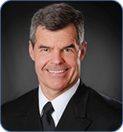
Dear Partners,
As we start a new year, I am honored to begin work with our preparedness partners as the new Director of the Office of Public Health Preparedness and Response (PHPR). I want to take a moment to thank Dr. Sonja Rasmussen, whom I know well from our time together at CDC’s Influenza Coordination Unit. Dr. Rasmussen provided critical leadership to PHPR during a turbulent time with continuous activations of our Emergency Operations Center for polio, unaccompanied children arriving from across the border, and Ebola. Her insights from the past six months have been invaluable to me during this period of transition.
As this is my first opportunity to reach out to you, I want to provide you with a sense of my background. I came to CDC in 1985 as an Epidemic Intelligence Service Officer. My 30 years here have provided me with the opportunity to work on a number of public health challenges, including reducing the burden of asthma, devising diagnosis and treatment strategies for malaria in Africa, leading efforts to eliminate measles from the United States, and evaluating the impact of air pollution regulations on deaths from carbon monoxide poisoning.
Looking back at some of the largest public health threats I have been involved with in recent years, I am struck by the continuing successful collaborations between CDC and our partners. After the H1N1 influenza pandemic arrived in 2009, I served as Incident Commander for CDC’s response. During that time, CDC and partners were able to fast track the vaccination of more than 80 million Americans against H1N1, reducing the potentially devastating effects of the virus on the U.S. public. We also communicated effectively with the public throughout the response. Today, the Ebola outbreak brings together partners from across government agencies to prepare for future cases of Ebola in the United States and to stop the disease in West Africa. As a senior adviser for the response, I saw first hand how much we were able to accomplish with partners such as the Department of Defense, USAID, the Department of State, national governments and ministries of health in affected countries in West Africa, and local and state public health departments in the United States. Through these partnerships, we have started to turn the tide in Liberia and with further effort expect the same in Sierra Leone and Guinea as we work to get to zero cases.
Our ongoing work with Ebola underscores the importance of our roles and the contributions we can make together to strengthen health security for our nation and the world. As the year progresses, I will reach out to you through this newsletter to highlight our priorities, share challenges and achievements, and draw your attention to opportunities for collaboration that will enable us to collectively safeguard our communities from public health threats. I look forward to working with each of you.
Stephen C. Redd, MD
RADM, USPHS
Director, Office of Public Health Preparedness and Response
Centers for Disease Control and Prevention
|
|
Noteworthy Updates
Preparedness Tool
The National Health Security Preparedness Index™ provides a fresh way to measure and advance the nation’s readiness to respond to large-scale emergencies of all kinds. The 2014 Indexincludes an expanded structure, additional measures, and updated data -- linking 194 measures across six domains to portray more fully the U.S. and states’ preparedness.
Partnerships Ebola Website
Additional Resources
Visit the Ebola Community Education Tool Kit to find cleared factsheets, infographics, presentations, and other useful resources for sharing information about Ebola with your community.
Upcoming Training
During February and March, CDC is offering a 3-day introductory training coursefor licensed clinicians (e.g., nurses, physicians, and other healthcare providers) intending to work in Ebola treatment units in Africa.
|
댓글 없음:
댓글 쓰기